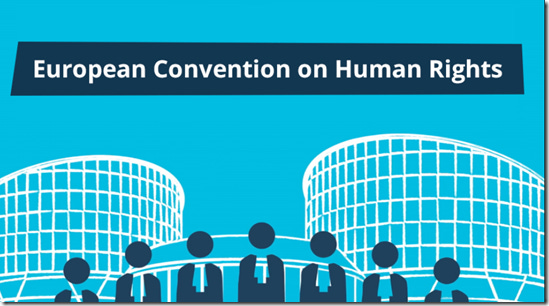The ECHR Ruling On ‘Defaming’ Muhammad Is An Anti-Muslim Act

The European Court of Human Rights (ECHR) has ruled that ‘defaming' the Prophet Muhammad “goes beyond the permissible limits of an objective debate" and "could stir up prejudice and put at risk religious peace”.
The ruling was passed against an Austrian national referred to as 'E.S' in reports. Mrs. S, born in 1971 held two seminars in 2009 entitled ‘Basic Information on Islam’.
Referencing Muhammad’s marriage to 6 year old Aisha, Mrs. S was reported to have said “Muhammad liked to do it with children” and “... A 56-year-old and a six-year-old? … What do we call it, if it is not paedophilia?”
This lead to a conviction and a failed appeal process:
Mrs S. was later convicted in February 2011 by the Vienna Regional Criminal Court for disparaging religious doctrines and ordered her to pay a fine of 480 euros plus legal fees.
After having her case thrown out by both the Vienna Court of Appeal and Austria's Supreme Court, the European Court of Human rights backed the courts' decision to convict Mrs S. on Thursday.
The ECHR found there had been no violation of Article 10 (freedom of expression) of the European Convention on Human Rights.
The ECHR claimed this decision was made to protect “religious feelings” and “the legitimate aim of preserving religious peace in Austria.” They went on to add that this sort of “abusive attack on the Prophet of Islam” could “stir up prejudice and put at risk religious peace.”
There are many reasons why this decision is an affront to basic human rights such as freedom of speech. However, the ECHR also seems blissfully unaware of the own goal they have scored in “stirring up prejudice” themselves.
It’s this type of special treatment afforded to Muslim “feelings” that sends a clear message that Muslims are different from the rest of us. It tells people that Muslims are to be feared and cannot be expected to respond reasonably to speech they do not like. How low of an opinion must you have of Muslims to claim that “religious peace” would be placed in jeopardy to allow comments of this kind? Islamists and Jihadists share this very same mindset too, but express it in a more concise way: “Don’t criticise our beliefs or we will kill you”.
Whilst the ECHR ruling comes to us from a secular authority, the silence on this decision from prominent Muslims and groups is deafening. How many of these groups and individuals who claim to fight for ‘human rights’ will go on record to defend free speech here? How many will state in no uncertain terms that it should never be illegal to say ‘offensive’ things about Muhammad and Islam? Anything short of this moral clarity is a willingness to allow Islamic blasphemy law. And you cannot claim to be for both ‘human rights’ whilst remaining silent on the imposition of blasphemy.
Furthermore, the people who make these decisions do not seem to understand how counterproductive they are to their own stated goals. The moment you are unreasonably told “you cannot say that”, it becomes absolutely necessary to shout precisely “that” from the rooftops. Expect to hear much more “Muhammad was a Paedophile” rhetoric in the coming weeks, solely in response to this ruling. The ECHR, by their own logic now appear to have risked jeopardising ‘religious peace’.
Speech of this kind should never lead to legal action. What the authorities should do if they have any actual interest in maintaining “peace” is to enforce existing (and reasonable) laws against those who respond to words with violence. This would better serve both Muslims and non-Muslims alike.
Stephen Knight is host of The #GSPodcast. You can listen to The Godless Spellchecker Podcast here, and support it by becoming a patron here.


